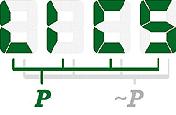Paper: Decidable and undecidable fragments of first-order branching temporal logics (at LICS 2002)
Authors: Ian Hodkinson Frank Wolter Michael ZakharyaschevAbstract
In this paper we analyze the decision problem for fragments of first-order extensions of branching time temporal logics such as computational tree logics CTL and CTL* or Prior's Ockhamist logic of historical necessity. On the one hand, we show that the one-variable fragments of logics like first-order CTL* - such as the product of propositional CTL* with simple propositional modal logic S5, or even the one-variable bundled first-order temporal logic with sole temporal operator `some time in the future' - are undecidable. On the other hand, it is proved that by restricting applications of first-order quantifiers to state (i.e., path-independent) formulas, and applications of temporal operators and path quantifiers to formulas with at most one free variable, we can obtain decidable fragments. The same arguments show decidability of `non-local' propositional CTL*, in which truth values of propositional atoms depend on the history as well as the current time. The positive decidability results can serve as a unifying framework for devising expressive and effective time-dependent knowledge representation formalisms, e.g., temporal description or spatio-temporal logics.
BibTeX
@InProceedings{HodkinsonWolterZakh-Decidableandundecid,
author = {Ian Hodkinson and Frank Wolter and Michael Zakharyaschev},
title = {Decidable and undecidable fragments of first-order branching
temporal logics},
booktitle = {Proceedings of the Seventeenth Annual IEEE Symp. on Logic in Computer Science, {LICS} 2002},
year = 2002,
editor = {Gordon Plotkin},
month = {July},
location = {Copenhagen, Denmark},
publisher = {IEEE Computer Society Press}
}
